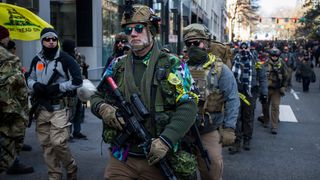It is easier to buy a gun than it is to vote in Florida. There are many proposed solutions to the United States’ gun problem, but gun licensing is one that has correlated strongly with decreased gun crime in states where it has been implemented. Approaching gun licensing at the federal level has the potential to amplify these results.
Currently, about 40 per cent of Americans claim to own a gun or live in a household with a gun. According to research from the US Council on Foreign Relations in 2017, the most recent year with complete data, the US had less than five per cent of the world’s population, but about 46 per cent of the world’s civilian-owned guns.
According to Pew Research, in that year 39,773 people died from gun-related injuries. That total was the highest on record. The use of guns in suicides also hit a new high in 2017, reaching 23,854 deaths. Despite these high numbers, it is mass shootings that dominate the gun control debate.
There are many definitions of what constitutes a mass shooting. The Gun Violence Archive defines a mass shooting as an incident where four or more people - excluding the shooter - are injured or killed with a gun. According to this metric, 373 people died in mass shootings in 2018. While mass shootings only make up 2.5 per cent of the 2018 total gun deaths in the country, they are high-profile and instil fear while still contributing to the overall high gun death rate.
Comparing the US gun death rates globally also shows an extreme disparity. Its rate of 10.6 deaths per 100,000 people is significantly higher than that of equally developed countries, such as the United Kingdom’s rate of 0.3 per 100,000 and Canada’s rate of 2.1 per 100,000 people.
There is currently no federal law requiring gun licensing for owning or purchasing a gun and many states have not taken action to address high gun death rates or the fact that guns can easily travel across state lines.
Gun licensing at the state level
Although there are currently no gun federal licensing laws, there have been some implemented in many states. Analyses of these laws show a significant correlation between implementing gun licensing and reduced firearm death rates.
Studies, such as those conducted by the American Journal of Public Health and Preventive Medicine, have shown that the implementation of gun licensing laws can be coupled with significantly fewer gun homicides and gun suicides. For example, Connecticut’s firearm homicide rate decreased by 40 per cent after passing a licensing law. In a study of licensing laws across 80 urban counties, the Journal of Urban Health found that there was an 11 per cent decrease in firearm homicides in association with the implementation of licensing laws.
Additionally, states, where gun ownership is much less regulated, such as Alabama, Alaska, and Louisiana, have firearm death rates that are more than four times higher than the highest regulated states, such as New York, Connecticut, Hawaii and Massachusetts.
These studies have also shown the removal of gun licensing laws can have an adverse effect on the firearm homicide rate. An example is in Missouri, where the firearm homicide rate increased by 25 per cent after repealing its licensing law.
Americans also strongly support licensing laws, according to public opinion polls. A Quinnipiac University poll found that 77 per cent of Americans support a legal licensing requirement before buying a gun. Of those supporting gun licensing in this study, 68 per cent were gun owners themselves.
The benefits of gun licensing as federal law
Additional gun violence research must take place and it recently received federal funding, but it was difficult to accomplish since 1996 due to the Dickey Amendment. This vague amendment banned funding used to advocate or promote gun control, and out of fear of penalisation, it blocked the Center for Disease Control and Prevention from researching gun violence, until recently. Additional data from research would demonstrate whether the relationship between gun licensing and firearm deaths is simply indicative of correlation or in fact causation. Regardless of what the data ultimately shows, the current evidence from the effects of gun licensing only shows an improved outcome in the states where it has been implemented.
The Second Amendment has been used frequently as a constitutional counterargument to federal gun control legislation. While gun licensing does impinge upon an absolute right to gun ownership, it is no different in nature from already existing age restrictions and increasing scrutiny on gun owners’ mental health, which Americans overwhelmingly support. In fact, 2017 Pew research showed that 89 per cent of both gun owners and non-gun owners supported measures to prevent the mentally ill from purchasing guns.
An increase in federal gun regulation is absolutely necessary to improve upon the current firearm death rate. While gun licensing has been successful on the state level, it does not address the common issue that someone can buy a gun in a state with relaxed gun laws and simply drive across state borders. For example, 60 per cent of the guns used to commit crimes in Chicago between 2009 and 2013 came from other states, particularly neighbouring Indiana and Wisconsin which both have more relaxed gun laws.
Federal gun licensing laws would be a practical first step to a safer America, lowering the firearm death rate without impinging on Second Amendment rights in a manner that is already accepted by a majority of Americans.






